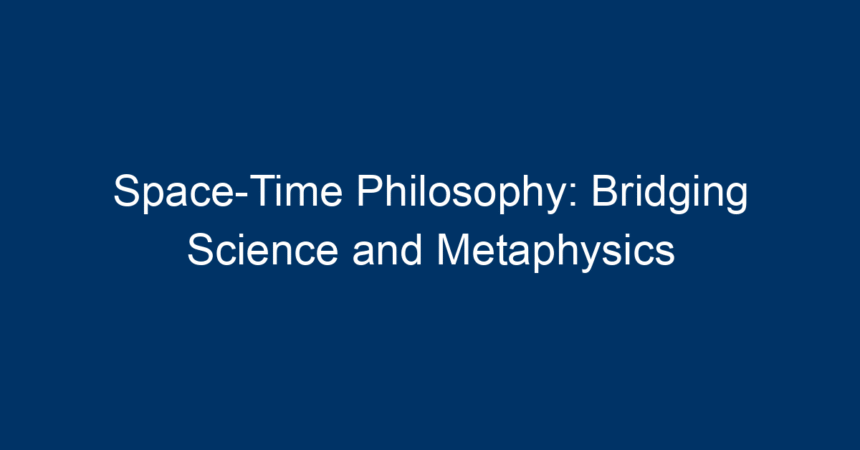In the grand tapestry of human understanding, few threads are as intricate and compelling as those woven from the fabric of space-time. The concept of space-time philosophy offers a fascinating intersection between science and metaphysics, challenging us to rethink our understanding of reality. As we explore the multifaceted dimensions of this philosophy, we will uncover its implications not just for scientists and philosophers, but for anyone curious about the universe.
Understanding Space-Time: The Scientific Perspective
What Is Space-Time?
At its core, space-time is the framework that combines the three dimensions of space with the one dimension of time into a single four-dimensional entity. This groundbreaking concept was formalized in Einstein’s theories of relativity, where he demonstrated that gravity is not just a force but a curvature of this space-time continuum.
The Science Behind Space-Time
Einstein’s theory revolutionized classical physics and offered a view of the universe that defied common sense. It suggested that time is not a constant but is affected by speed and gravity. For example, time moves slower for someone traveling at the speed of light compared to someone stationary on Earth. This perspective invites us to reconsider the nature of existence, blurring the lines between past, present, and future.
The Philosophical Aspects of Space-Time
Space-Time in Metaphysics
Philosophers have long debated the implications of space-time philosophy. While science provides a quantitative framework, metaphysics grapples with the qualitative aspects, questioning the nature of reality itself. Is space-time a fundamental structure of the universe, or is it merely a human construct to make sense of our experiences?
Major Philosophical Theories
-
Presentism:
Presentism posits that only the present moment is real, while the past and future are mere abstractions. This theory confronts the implications of modern physics, challenging the idea of an objective timeline. -
Eternalism:
Eternalism, on the other hand, argues that all points in time—past, present, and future—are equally real. This notion aligns closely with the scientific understanding of space-time, providing a philosophical framework that reconciles with relativity. - Nihilism vs. Realism:
The debate over nihilism and realism in space-time philosophy questions whether our perceptions of time and space correspond to an external reality or if they are simply illusionary constructs reflecting human cognition.
Bridging Science and Metaphysics
The Interdisciplinary Connection
Space-time philosophy serves as a bridge between empirical science and abstract thought. Scientists use mathematical models to describe the universe, while philosophers explore the underlying meanings and implications of these models. This interplay not only enriches our understanding but also reflects a holistic view of human inquiry.
Implications for Our Understanding of Reality
By examining the philosophical dimensions of space-time, we open ourselves up to new possibilities. This intersection invites a reconsideration of free will, determinism, and the very nature of existence. As we ponder the implications of a multi-dimensional universe, we must ask ourselves: What does it mean to be human in a world where time is not linear, and space is not absolute?
The Role of Space-Time Philosophy in Modern Society
Influencing Modern Technology
The principles of space-time philosophy have extended beyond theoretical discourse and into practical applications. Technologies like GPS rely on the concepts of relativity to function accurately. If time was treated as a constant, our navigation systems would falter, illustrating the real-world relevance of space-time considerations.
Advancing the Dialogue Between Science and Philosophy
In an era marked by rapid technological advancements and scientific discoveries, space-time philosophy encourages ongoing dialogue between different fields. It challenges us to think beyond traditional disciplines, fostering greater collaboration between scientists and philosophers.
Actionable Insights and Practical Applications
Embracing Interdisciplinary Learning
To truly appreciate the richness of space-time philosophy, consider engaging with both scientific literature and philosophical texts. This interdisciplinary approach will broaden your understanding and spark creativity in your thinking.
Exploring Personal and Cultural Perspectives on Time
Reflect on your own experiences of time and space. How does your cultural background shape your perception? Engage in discussions with others to expose yourself to different viewpoints, fostering a more nuanced understanding of existence.
Encouraging Open-Ended Inquiry
In the spirit of space-time philosophy, embrace questions rather than rush to conclusions. What possibilities exist beyond your current understanding? Allow your curiosity to guide you in exploring profound philosophical inquiries.
Conclusion: A Unified Vision of Existence
Space-time philosophy is more than an academic curiosity; it is an invitation to engage with the mysteries of our universe. By bridging the divide between science and metaphysics, we not only enrich our understanding of the cosmos but also deepen our appreciation for the interconnectedness of all things.
As we navigate the vast and intricate fabric of reality, let us remember that the exploration of space-time is as much about the journey as the destination. Each question, each moment of reflection, serves to illuminate our place in this extraordinary universe.
In a world increasingly driven by specialization, the time has come to embrace the richness of interdisciplinary inquiry. As we learn to appreciate the complexities of space-time philosophy, we will become not just better thinkers but more enlightened individuals, contributing to a brighter future for all of humanity.




